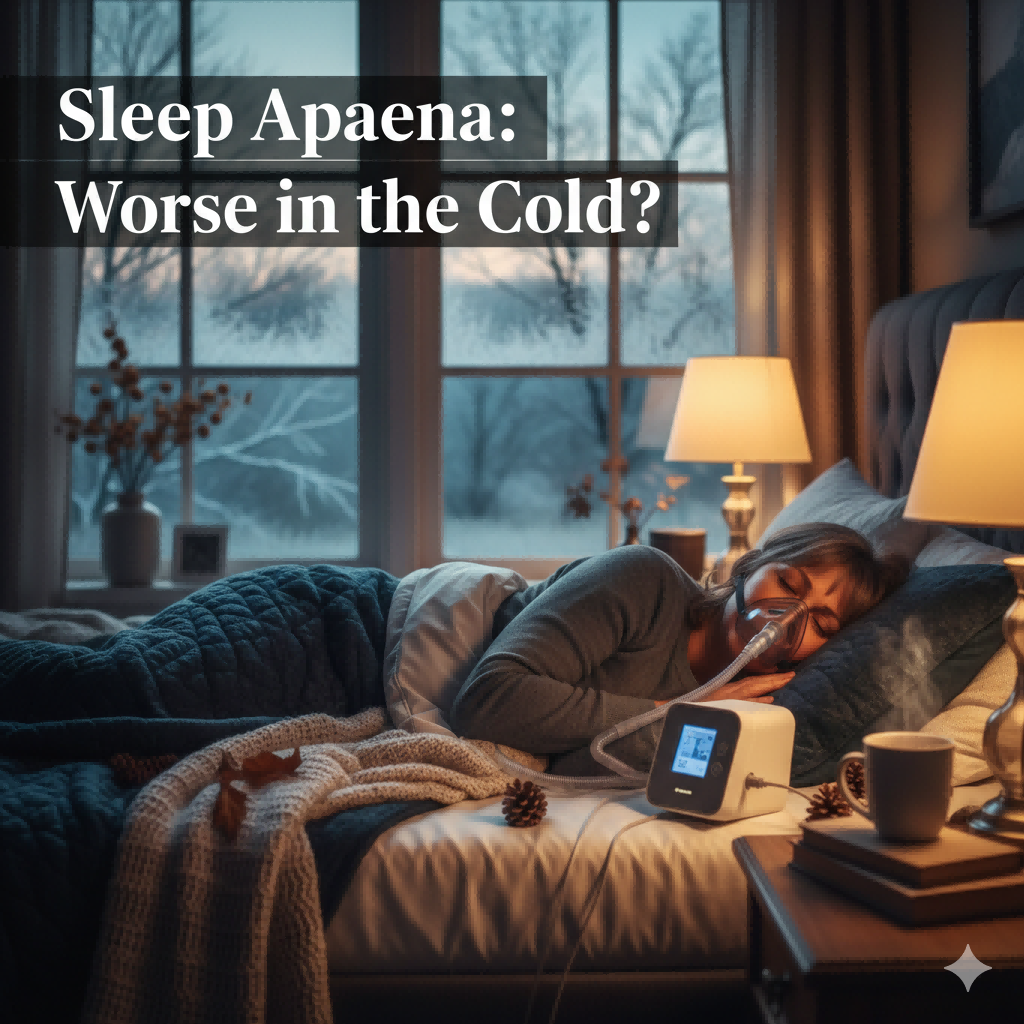Is Sleep Apnea Worse in the Fall and Winter?


Sleep apnea is a serious sleep disorder that affects millions of people worldwide. As the seasons change, many patients notice their symptoms intensifying, particularly during the fall and winter months. But is sleep apnea actually worse in the colder seasons, or is this just a coincidence? Let’s explore how weather, temperature, and seasonal habits may influence this condition and what you can do to manage it.
Understanding Sleep Apnea
What is Sleep Apnea?
Sleep apnea is a sleep disorder where breathing repeatedly stops and starts during the night. These pauses can last a few seconds to minutes and may occur dozens of times per hour. The result is poor sleep quality, reduced oxygen intake, and a host of long-term health risks.
Types of Sleep Apnea (OSA, CSA, Complex)
There are three main types:
- Obstructive Sleep Apnea (OSA): The most common, caused by a blocked airway.
- Central Sleep Apnea (CSA): The brain doesn’t send proper breathing signals.
- Complex Sleep Apnea: A mix of both conditions.
Common Symptoms and Risks
Key signs include loud snoring, choking during sleep, morning headaches, fatigue, and irritability. Left untreated, sleep apnea can increase the risk of heart disease, high blood pressure, diabetes, and even stroke.
Seasonal Changes and Sleep Health
How Weather Affects Breathing During Sleep
Our respiratory system responds differently depending on humidity and temperature. Cold, dry air can irritate nasal passages, making breathing harder for those with sleep apnea.
The Role of Temperature in Sleep Quality
The body naturally cools down during sleep, but extremely cold air can trigger airway constriction. This worsens nighttime breathing issues.
Allergens and Respiratory Triggers in Different Seasons
Fall brings ragweed pollen, while winter is notorious for dust, mold, and indoor allergens—factors that aggravate apnea symptoms.
Why Sleep Apnea May Worsen in Fall and Winter
Cold Air and Airway Constriction
Breathing in cold air causes airway tightening, increasing the chances of snoring and apnea episodes.
Indoor Heating and Dry Air Effects
Heated indoor environments dry out nasal passages and throat tissues, making blockages more likely.
Increased Risk of Respiratory Infections
Colds, flu, and sinus infections are common in winter and can exacerbate apnea by blocking nasal passages.
Weight Gain and Lifestyle Changes in Colder Months
Holiday eating, reduced physical activity, and winter weight gain add pressure on the airway, making sleep apnea more severe.
Medical Insights on Seasonal Sleep Apnea
Research Findings and Clinical Studies
Several studies have found that hospital admissions for respiratory issues spike in winter. Patients with OSA often report worsening symptoms during colder months, supporting the link between seasons and apnea.
Doctors’ Recommendations for Patients
Specialists recommend humidifiers, nasal sprays, weight control, and consistent CPAP use during fall and winter.
Practical Tips for Managing Sleep Apnea in Fall & Winter
Optimizing Bedroom Environment
- Keep your bedroom temperature between 60–67°F for ideal sleep.
- Use blackout curtains to maintain a consistent sleep cycle.
Using Humidifiers and Air Purifiers
A humidifier adds moisture to dry indoor air, while an air purifier helps reduce allergens like dust and pet dander.
Maintaining a Healthy Lifestyle During Cold Seasons
- Stick to a balanced diet.
- Engage in light indoor exercise to prevent weight gain.
- Avoid alcohol and sedatives before bed.
When to Adjust CPAP Settings
Some patients may require slight pressure adjustments during winter. Always consult your doctor before making changes.
Natural Remedies and Home Care
Breathing Exercises and Nasal Care
- Practice deep-breathing techniques to strengthen lung function.
- Use saline sprays to keep nasal passages clear.
Warm Beverages and Relaxation Techniques
Herbal teas, steam inhalation, and relaxation before bed can reduce congestion and promote better sleep.
FAQs About Seasonal Sleep Apnea
1. Can allergies make sleep apnea worse in fall?
Yes, ragweed and mold are common allergens in fall that may worsen symptoms.
2. Why do I snore more in winter?
Cold, dry air and indoor heating irritate your airways, making snoring more likely.
3. Should I use a humidifier for sleep apnea?
Absolutely. A humidifier keeps your airway moist and reduces irritation.
4. Does weight gain during winter affect sleep apnea?
Yes, extra weight increases pressure on the airway, worsening symptoms.
5. Can CPAP therapy be less effective in colder months?
Not usually, but dryness and congestion can interfere. Heated tubing or humidifiers help.
6. When should I see a doctor about worsening symptoms?
If your apnea episodes increase, or you feel excessively tired despite CPAP use, consult a sleep specialist.
Conclusion
So, is sleep apnea worse in the fall and winter? For many patients, the answer is yes. Cold air, indoor heating, seasonal allergies, and lifestyle changes all contribute to worsening symptoms. The good news is that with proactive care—humidifiers, healthy habits, and consistent CPAP use—you can manage your sleep apnea effectively throughout the colder months.
👉 To learn more about seasonal sleep health, check out resources from the American Academy of Sleep Medicine.
















